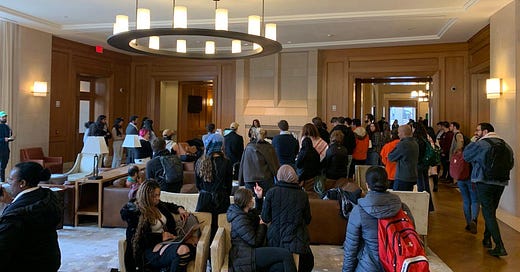
HLS Student Government Demands Harvard Divest from Israel
The non-binding resolution accuses Israel of engaging in a 'genocidal campaign in Gaza.'
The Harvard Law School Student Government passed a resolution this morning urging the Harvard Management Company, which oversees the university’s endowment, and all organizations affiliated with Harvard to withdraw investments that facilitate the alleged “ongoing legal occupation of Palestine and the genocide of the Palestinians.” The group, an elected body tasked with voicing student opinion and overseeing student life at HLS, approved the measure in an anonymous vote of twelve to three with four abstentions.
The demands are extensive. The resolution calls on the HMC to divest from “weapons manufacturers, firms, academic programs, corporations, and all other institutions” tied to the occupation in Palestine. It also cites a 2020 Crimson analysis of Harvard’s holdings related to the conflict. The report lists examples such as Booking.com, which offers vacation rentals in Palestine, and General Mills, which operates a factory in East Jerusalem which hires Palestinians. Many of the companies are held by Harvard through ETFs—funds that bundle hundreds of investments together—meaning the companies in question might make up a small fraction of the total investment.
Two members of the Harvard Law School Student Government resigned following the vote. In a letter addressed to the student body, they allege that the vote was held in violation of the Student Government Constitution and Bylaws by improperly allowing anonymous voting. They also claim that “this resolution was drafted without meaningful opportunity for interested students to provide input or express their potential concerns.” The Harvard Jewish Law Students Association, for their part, denounced it as antisemitic, claiming that it “asks the campus and the world to assume that those who have any connection to Israel are villainous.”
In contrast, multiple pro-Palestinian student groups at Harvard were quick to praise the resolution. Such groups have frequently condemned the university’s refusal to boycott Israel in the past; in one instance, students urged their classmates to stop eating the dining hall’s hummus on the grounds that the company that produces it previously donated food to an IDF brigade.
Such controversies have been particularly pronounced since the beginning of Israel’s war in Gaza. A joint statement from numerous student organizations that held the Israeli regime “entirely responsible” for Hamas’s terrorist attack was followed by frequent public protests by pro-Palestine activists. Those protests led to the now-infamous congressional hearing with former President Claudine Gay that contributed to her quick resignation. Protestors occupying Widener Library also harassed Sen. Dan Sullivan ‘87 on a visit shortly after Gay’s testimony.
The resolution situates itself amidst a series of Harvard divestment movements, including the university’s decision to divest from the South African military during apartheid and, most recently, its discontinuation of investments in the fossil fuel industry. The resolution appears to go beyond the university’s “selective divestment” from South Africa, however, in implicating almost all financial investments connected to Israel. It will likely stoke additional controversy as campus continues to debate the line between opposition to the policy of the Jewish state and antisemitism.







Hamas publicly states they want to annihilate Israel but the left says they aren’t genocidal. Israel defends itself against those who want to destroy it and is accused of being genocidal. It is a crazy world we live in.
Shameful these people are going to be allowed to sit for the bar and become attorneys. Words have meaning and this is not "genocide" nor is Israel a "settler occupation." Israel does have a right to defend itself against terrorists.